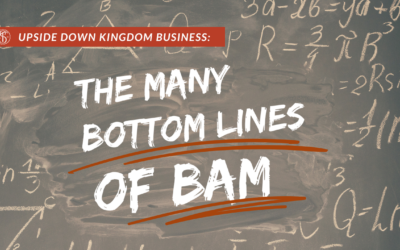This is a story of a Business as Mission (BAM) practitioner on the field using business as a mechanism for planting the church in areas of the world where you can’t do that with traditional missionary methods. In order to protect the work being done we will not be sharing their names or specific locations for their protection.
Imagine that you have arrived in a country that is ‘behind the times’, or even one that isn’t. The culture is completely different than your own. The food is different. What everyone wears is different. How conflict is resolved is different. Needs are different. Everything is different.
It’s easy to think quickly that if you would just have the opportunity to explain to them how to do a few certain things, then their life would be better and so would yours.
Think again.
When we come into another culture it takes many big adjustments and probably hundreds, or more than likely thousands, of small adjustments. It’s a difficult road to navigate and even more difficult if we come with an attitude that our ways are better. Our ways might be better to us, but not everyone, and certainly not an entire culture, will agree with us.
This can cause an internal war within us as to how to live peacefully doing most things in ways that seem arbitrary to us.
So what do we do?
Do we cave and do everything the way they do it? Do we share different (or better, if we are honest) ways of doing things that they just don’t know yet?
From my experience of 12 years of living in a culture outside of the one I was brought up in, I would contend that the best approach is one of understanding. Instead of looking at situations as black and white or one way is better, if we strive to understand ‘the why’ then this can lead us to many open doors of communication and personal growth.
What does this have to do with a BAM business model?
A lot. Everything.
It is easy to come into a culture that is new to us and see what is ‘lacking’ and make decisions, based on our worldview, what types of businesses would be beneficial or helpful.
I’ll wave the red flag of caution here and beseech you to approach these decisions differently.
A Story
Maybe this story will help illustrate…
I have a western friend that worked in another country for many years. She became very concerned for the poor that were living at the railroad stations in this desperate, dirty and very crowded country. She and a group of friends began to go and visit the people there and brought food, blankets, toothbrushes and other necessities for them when they would go.
They would listen to their stories, share with them, and go back and do it all over again the next week or so.
This went on for many months.
One day, when they brought the food and necessities to give away, they noticed the food was taken quickly but the other items weren’t. This confused my friend and her team that had been so diligent to gather things that ‘people like this’ need. That day as she was talking to a lady at the railway station, she asked her if she needed any of the things that hadn’t been taken.
The lady turned and pulled back a piece of plastic that she had recovered from a torn billboard. My friend was shocked to see several of the blankets, a pile of toothbrushes and other items under the plastic just sitting there not being used.
The lady at the railway station looked at my friend and said, “we don’t need these things.” My friend said she felt a wave of anger hit her face. She couldn’t understand how someone so poor didn’t need whatever was brought to them.
As she tried to push back her shock and anger, she was able to just simply ask this lady, “well what do you need?” Fully expecting the answer to be money, my friend was shocked again when that wasn’t the answer. With a quiet tone and eyes that melted you, the railway lady said, “we need containers that rats can’t eat through.”
Paradigm Shift
My friend sat there in astonishment. She said she realized in that moment that she had never asked anyone there what their needs actually were. She had just assumed she knew. More than that, they had been very proud that each week they had plenty of food for everyone there, knowing that it would last them at least several days.
Now she wondered who had actually eaten the food…the people or the rats.
It is important that we seek to understand. When we come with business model ideas, that is not a bad thing. What is even better, though, is when we come with ideas, and then understand the culture to see how (and if!) that model can work in the culture we are engaging.




